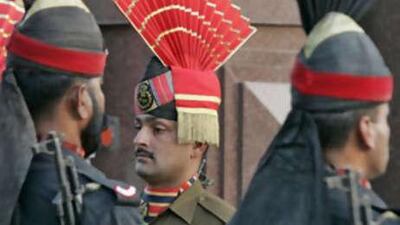New Delhi // India reacted cautiously to Pervez Musharraf's resignation yesterday as president of Pakistan amid concerns his successor may not be as willing, or able, to engage in a peace process between the two nuclear-armed neighbours that has recently come under severe strain. "We are very clear we will always be talking to the government of Pakistan and the leadership of Pakistan whosoever is the president or the prime minister," Anand Sharma, a junior foreign minister, said in New Delhi, shortly after Mr Musharraf announced he was stepping down. Indian security officials believe the peace talks, launched in 2004 after Islamabad declared a unilateral ceasefire in the disputed region of Kashmir, were successful primarily because of Mr Musharraf. India and Pakistan have fought three wars since their independence from Britain 61 years ago over Kashmir, a Himalayan region divided between them but claimed by both, and an 11-week border skirmish in the Kargil region in 1999 in which 1,200 soldiers from both sides died. Indian officials believe that since Mr Musharraf gave up his post as chief of the army in November, the country's military and spy agency, the Inter-Services Intelligence agency, have become more emboldened in their support of militants attacking Indian interests, including the bombing of the Indian Embassy in Kabul that killed more than 60 people this summer. Pakistan has denied the allegations but, nevertheless, has agreed to investigate. Last week, M K Narayanan, India's national security adviser, expressed apprehension over Mr Musharraf's possible departure, saying his concern was not regarding the Pakistani leaders proposed impeachment but New Delhi's inability to identify "who controlled all the levers [of power]", in Islamabad. "Like nature abhors a vacuum, we abhor the political vacuum in Pakistan," Mr Narayanan told Singapore's Straits Times, adding that a post-Musharraf, politically turbulent Pakistan was worrisome. Following Mr Musharraf's exit, Mr Narayanan predicted trouble from militants, not only on the Pakistan-Afghan border but also in India's part of Kashmir, where Islamic groups, allegedly with the support of Pakistan's ISI, are fighting Indian rule. During the past four years of talks, India's security establishment believed Mr Musharraf, when he still had his dual role as army chief, was largely responsible for keeping a check on radical elements within the Pakistani military and the ISI, as well as improving trade and communication links between the two. Cross-border raids across Kashmir fell to their lowest level, and bilateral trade grew from US$500 million (Dh1.83 billion) in 2004 to more than $2bn in 2007. Under Mr Musharraf, the two nuclear-armed rivals also agreed to give advance warning before testing any missiles. Mr Musharraf, at the apogee of his power, also made the boldest proposals ever in resolving the Kashmir crisis by suggesting both sides repeal their claims to the Himalayan territory and permit the region to be self-governing. A cautious and suspicious India, however, declined and the moment passed. But with Mr Musharraf gone, Indian security analysts anticipate trouble from a politically beleaguered Pakistan under increasing pressure from a resurgent al Qa'eda and its Taliban associates, and compounded by a deteriorating economy. They said large areas of the Pashtun-dominated North West Frontier Province bordering Afghanistan were effectively under al Qa'eda and Taliban control. With inflation at more than 26 per cent, depressed economic activity and critical power and grain shortages, insurgents were exploiting the dissatisfaction to foment unrest that could target India. "Under such adverse conditions, India will become the bogeyman to deflect Pakistan's internal chaos," said retired Brig Arun Sahgal, of the New Delhi-based United Service Institution and government adviser on Pakistan. This could mean strident rhetoric on Kashmir and increased firing along the Line of Control that divides the disputed state and support to armed insurgents operating within the region. "India remains wary of dealing with a civilian Pakistani government on sensitive matters like Kashmir as no resolution of the complex issue is possible without the involvement and endorsement of the military," retired Major Gen Sheru Tahpliyal said. Whoever comes after Mr Musharraf must have the confidence of the military and the security services, particularly the ISI, in order to ensure a lasting peace between the neighbours, he said. But other Pakistan analysts in India were less negative, believing the peace process would continue more "realistically" as Pakistan's civilian government wanted to forge better ties with India. "Peace talks will continue with a little more pragmatism and enthusiasm," said Kuldip Nayar, former MP and diplomat and India's foremost commentator on Pakistan. After decades of conflict and confrontation, there is a great desire to give peace a chance, he said. @email:rbedi@thenational.ae

Departure rattles peace talks
India has concerns that Pervez Musharraf's successor may not be as willing to engage in a peace process.
Most popular today
